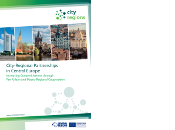The Wrocław urban region is located in the eastern part of the Lower Silesia voivodeship. The city of Wrocław has 633,000 inhabitants, and the Wrocław Metropolitan Area with 27 surrounding municipalities has a population of around 1,180,000. Due to good access to internal markets and the European market, a well-qualified labour force and a successful economic transformation, Wrocław has become one of the leading cities in Poland.
Of course, political, social and economic change have significantly affected the development of the Wrocław urban region. The functional area of the Wrocław agglomeration has been formed, and a metropolitan identity has emerged.
These processes lead to new challenges for local authorities, since it is necessary to improve the competitiveness of the area, to ensure high standards of living and to keep up the pace of economic development.
Description of the pilot scheme
Within the scope of the project, three thematic interventions aimed at the improvement of the quality of life of the inhabitants of the Wrocław Metropolitan Area have been realised:
- Evaluation of transport needs with particular reference to the Park & Ride system;
- Development of a concept of coherent green infrastructure for various kinds of tourism and recreation;
- Improvement of the functioning and the availability of pre-school education and kindergarten institutions.
Commuters need a well-organised system of public transport which combines the benefits of public and individual transport in areas with low density of settlement. Therefore, local and regional authorities signed already in 2011 an agreement regarding the organisation and operation of public transport in the Wrocław agglomeration.
The negative effects of land degradation due to urban sprawl have forced local authorities to take another look at the functions and roles of open and green spaces in large urbanised areas. Coherent strategies to develop green infrastructure as a joint asset are needed to maintain the urban region as an attractive place to live and work.
Finally, taking into account processes of suburbanisation, new strategies for the provision of social services are needed. Depending on the location of settlements, there are many possibilities for intermunicipal cooperation in relation to pre-school education. However, efforts need to be coordinated, and the costs and benefits of investments need to be balanced.






